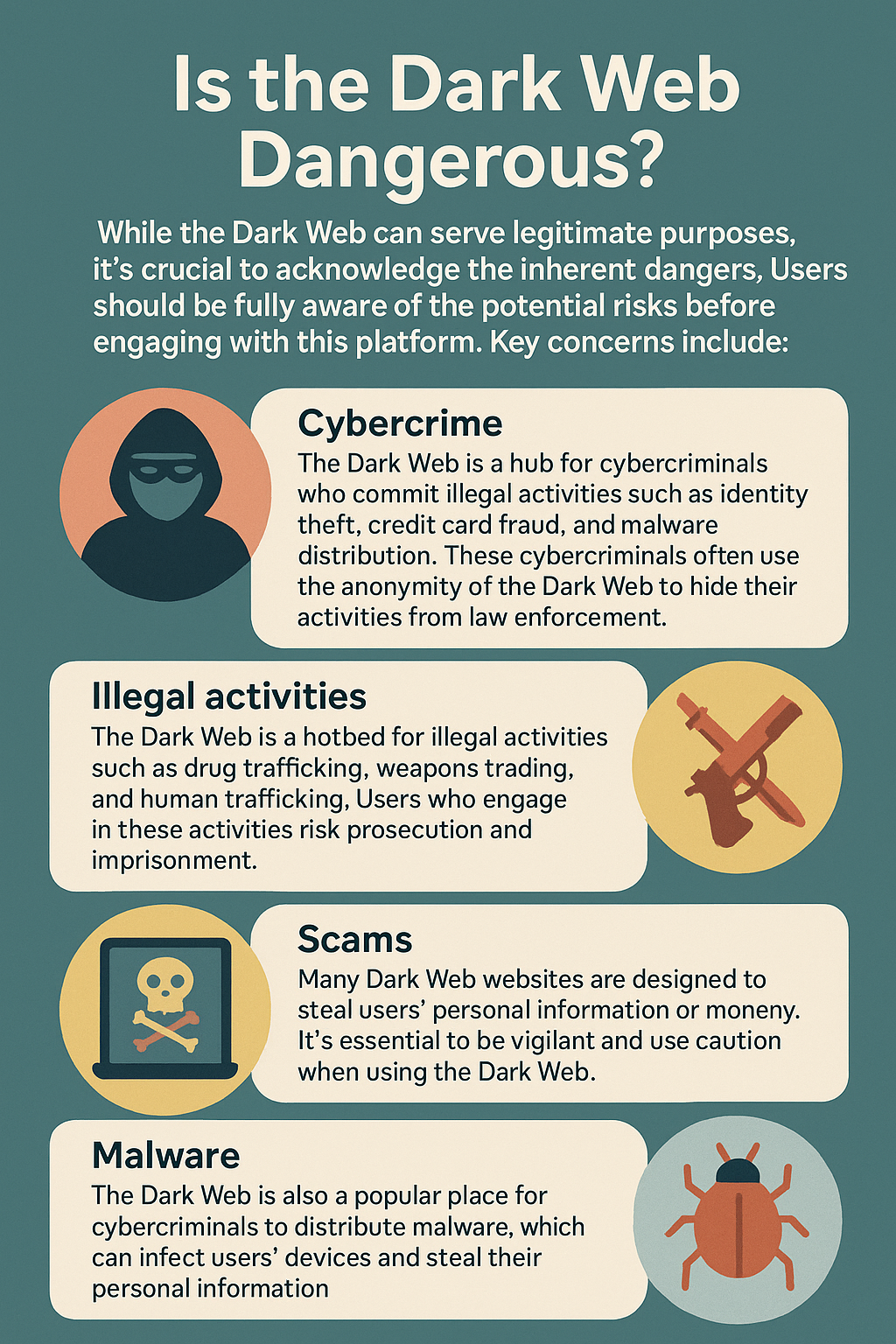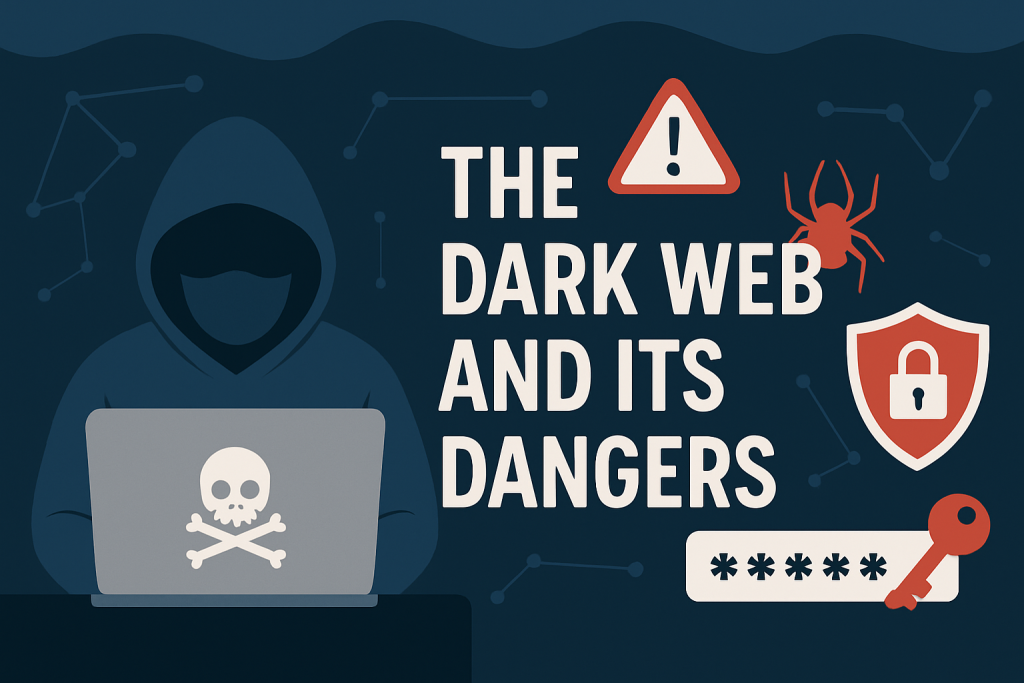The internet is an extensive and intricate network of information, and while much of it is accessible through traditional search engines like Google and Bing, there is also a portion of the internet known as the “Dark Web” that is hidden from view. Another term for the internet we all know and use daily is the “regular” internet. Although there are many hypotheses, nobody can be certain about these numbers. It is hardly unexpected, given how anonymous everything is. Surprisingly, the tiniest portion of the web is typically the most popular and accessible.
The Dark Web is a component of the internet that is not indexed by traditional search engines and requires special software to access. It’s where illegal activities occur and is home to some of the most dangerous elements of the online world.
The dark web is a secret network of websites that can only be accessed with a specialized web browser. It is used to maintain the privacy and anonymity of online activity, which is useful for both authorized and illegal purposes. The accessibility of it for potential criminal activities has also been reported, even though some people use it to avoid government censorship.
What is the Dark Web?
The Dark Web is an element of the internet that can only be accessed through specific software, such as Tor (The Onion Router), I2P (Invisible Internet Project), and Freenet. These software tools allow users to access hidden websites and communicate with each other anonymously.
The Dark Web is often associated with forbidden activities, such as drug trafficking, weapons trading, and human trafficking. While it’s true that illegal activities take place on the Dark Web, it’s important to note that not everything on the Dark Web is illegal. There are also legitimate uses for the Dark Web, such as whistleblowing, secure communication, and research.
Is the Dark Web Dangerous?
While the Dark Web can serve legitimate purposes, it’s crucial to acknowledge the inherent dangers. Users should be fully aware of the potential risks before engaging with this platform. Key concerns include:
- Cybercrime: The Dark Web is a hub for cybercriminals who commit illegal activities such as identity theft, credit card fraud, and malware distribution. These cybercriminals often use the anonymity of the Dark Web to hide their activities from law enforcement.
- Illegal activities: The Dark Web is a hotbed for illegal activities such as drug trafficking, weapons trading, and human trafficking. Users who engage in these activities risk prosecution and imprisonment.
- Scams: Many Dark Web websites are designed to steal users’ personal information or money. It’s essential to be vigilant and use caution when using the Dark Web.
- Malware: The Dark Web is also a popular place for cybercriminals to distribute malware, which can infect users’ devices and steal their personal information.

The Dark Web is a complex and dangerous place that should be cautiously approached. While there are legitimate uses for the Dark Web, users must be aware of the risks associated with accessing it. Cybercrime, illegal activities, scams, and malware are just a few of the dangers that users face when using the Dark Web. It’s important to use caution, be vigilant when using the Dark Web, and report any suspicious activity to law enforcement.
FAQs:
Ans. The dark web (or darknet) is a subset of the internet that is not accessible by default internet settings or search engines. While the dark web can have certain useful applications, such as anonymous communication and encrypted data sharing, there are also several risks associated with using it.
- Illegal activity: Drugs, explosives, confidential documents, and pirated items are just some of the unlawful items that have been known to sell quickly on the dark web. To those ignorant of the dark web’s dangers, viewing such material could result in serious legal repercussions.
- Malware and viruses: The dark web is rife with sites that host malware and viruses, posing a serious threat to the privacy and safety of everyone who visits them.
- Scams and fraud: There is a risk of being scammed or duped on the dark web, with some sites pretending to provide goods and services that do not exist.
- Hacking and surveillance: The dark web is plagued with hackers and cybercriminals who can try to steal sensitive information from site users or infiltrate their devices with spyware.
- Psychological harm: Some of the content on the dark web, such as graphic depictions of violence, might have a negative psychological impact on users.
Going to dark websites is not against the law, but doing unlawful things or viewing illicit content is. Anyone accessing the dark web via insecure means, such as without a virtual private network (VPN) or the Tor browser, should exercise extreme caution.
Ans. You should avoid illegal activities on the dark web, including drug trafficking, human trafficking, and the sale of stolen information. It’s also essential to avoid sharing personal information or engaging in any activity that could compromise your anonymity or put you at risk of cybercrime. Additionally, it’s important to be cautious when browsing the dark web and avoid clicking on suspicious links or downloading any files from untrusted sources as they could contain malware or viruses that could harm your device.







